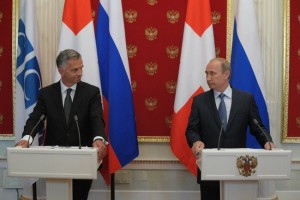Cross-posted from Consortium News

Official Washington's shock and disbelief at Russian President Vladimir Putin's calming words about Ukraine reveal more about the widening chasm between real-world nuances and the U.S. political/media elite's hysteria than any dramatic shift in course by Putin.
I'm told that what Putin is doing -- in urging ethnic Russians in east Ukraine to put off a referendum on possible secession and agreeing to pull Russian troops back from the border -- is part of a behind-the-scenes initiative coordinated with President Barack Obama to prevent the Ukraine crisis from spinning further out of control.
Obama's unusual style arose from his fateful decision to appoint a "team of rivals" to top national security posts after winning the presidency in 2008. To close a rift in the Democratic Party, he gave the hawkish Clinton the job of Secretary of State; and to maintain some continuity during wartime, he left George W. Bush's Defense Secretary Robert Gates in place and kept Bush's high command, including neocon favorite Gen. David Petraeus.
But Obama soon learned that running the U.S. government wasn't like managing a college seminar in which smart people sit around and debate various points of view. When actual policy decisions were at stake, such as whether to escalate the Afghan War by dispatching a "surge" of 30,000 troops and adopting a new "counterinsurgency" strategy, Obama found that powerful adversaries could manipulate the process by limiting his options and leaking to their friends in the news media.
In summer 2009, Obama was mouse-trapped into the neocon-favored "surge" in Afghanistan. The policy was devised by neocon theorist Frederick Kagan, pushed by Defense Secretary Gates and supported by Clinton and Petraeus, according to Gates's memoir, Duty.
Obama was thoroughly outmaneuvered and ended up acquiescing to the plan although he reportedly regretted the decision almost immediately. (Kagan's "surge" accomplished little beyond getting about 1,000 more Americans and many Afghans killed, without changing the trajectory of the failed war.)
But the Afghan "surge" experience apparently convinced Obama that he needed to beef up his own team, which he assembled in part from the ranks of CIA analysts who were working in the early days for one Obama loyalist, CIA Director Leon Panetta. Obama shied away from the other alternative of firing the "team of rivals" fearing political repercussions.
As Gates wrote in Duty, "Clinton and I represented the only independent 'power center' [in the Obama administration's national security decision-making], not least because, for very different reasons, we were both seen as 'un-fireable.'" What was remarkable about Gates's observation is that traditionally the President of the United States is considered the only "power center" that matters on foreign policy.
The "Un-fireables" Get Their Way
So, faced with these "un-fireables" at the Pentagon and State, Obama was forced to finesse his foreign policy whenever it was not fully in line with the preferences of Gates and Clinton. At some key moments, the "un-fireables" directly defied Obama's own desires, not only on Afghanistan but on the touchy issue of Iran's nuclear program.
For instance, in spring 2010, Secretary of State Clinton helped sink an agreement negotiated with Iran to ship most of its low-enriched uranium out of the country, even though President Obama had blessed the initiative undertaken by the leaders of Brazil and Turkey.
The Brazil-Turkey arrangement came under fierce attack by Clinton and was derided by leading U.S. news outlets, including editorial writers at the New York Times who mocked Brazil and Turkey as being "played by Tehran." The ridicule of Brazil and Turkey continued even after Brazil released Obama's private letter to President Luiz Inacio Lula da Silva encouraging Brazil and Turkey to work out the deal.
Despite the letter's release, Obama didn't publicly defend the swap and instead joined in scuttling the deal, another moment when Clinton and administration hardliners got their way. That set the world on the course for tightened economic sanctions against Iran and heightened tensions that brought the region close to another war, with Israel repeatedly threatening to attack Iran's nuclear facilities.
The Iranian nuclear negotiations only got back on track after Clinton left the State Department at the start of Obama's second term. But Obama's relationship to his State Department remained strained under Secretary Kerry who has been known to complain about his infrequent access to the President.
Whether as an expression of annoyance at having to deal with White House underlings -- or because he considers himself more steeped in world affairs than Obama -- Kerry has continued to operate as something of a free agent getting wide latitude to pursue his ultimately doomed effort to seek an Israeli-Palestinian peace deal. But Kerry has also charged out front as the most bellicose voice of the administration on major crises.
On Aug. 30, 2013, Kerry gave an extraordinary speech, which sounded like a declaration of war against Syria, only to have Obama pull the rug out from under him several days later and then reach a chemical weapons compromise brokered with the Syrian government by Russia's President Putin.
(Note: You can view every article as one long page if you sign up as an Advocate Member, or higher).





